Detailed Research Essay: Al-Kateb v Godwin Case and Immigration Law
VerifiedAdded on 2021/01/02
|8
|2042
|174
Essay
AI Summary
This research essay provides a comprehensive analysis of the Al-Kateb v Godwin case, which was decided by the High Court of Australia in 2004. The essay explores the legal arguments presented by both the majority and minority opinions, focusing on the interpretation of the Migration Act 1958 and its implications for the indefinite detention of unlawful non-citizens. The essay examines the key issues, including the legality of indefinite detention, the application of constitutional law, and the impact of the court's decision on immigration policy. It discusses the dissenting views of the minority justices and the subsequent legal and media reactions to the ruling. The essay concludes by highlighting the significance of the case in shaping Australia's approach to mandatory detention and its ongoing relevance in contemporary legal and political discourse.
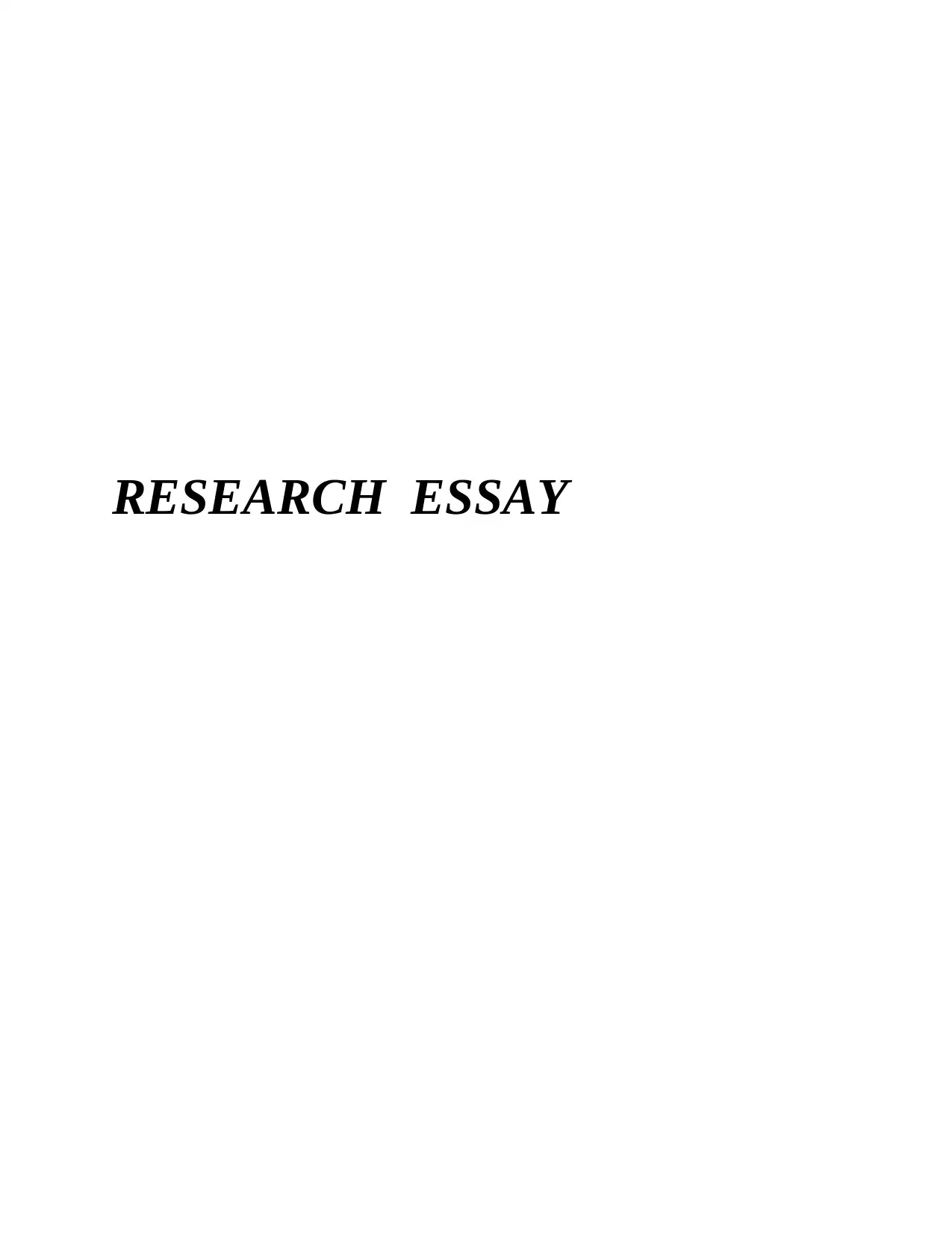
RESEARCH ESSAY
Paraphrase This Document
Need a fresh take? Get an instant paraphrase of this document with our AI Paraphraser
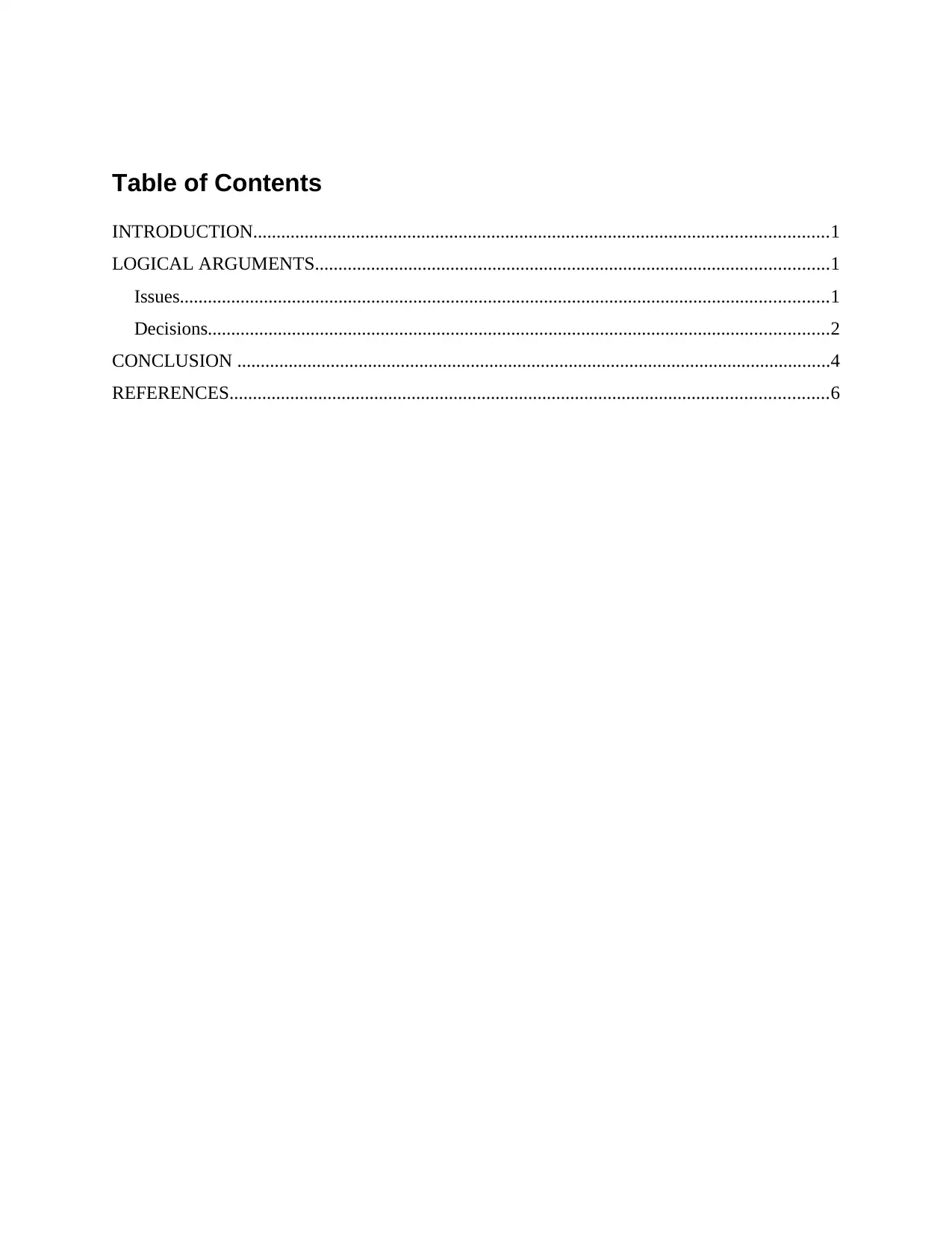
Table of Contents
INTRODUCTION...........................................................................................................................1
LOGICAL ARGUMENTS..............................................................................................................1
Issues...........................................................................................................................................1
Decisions.....................................................................................................................................2
CONCLUSION ...............................................................................................................................4
REFERENCES................................................................................................................................6
INTRODUCTION...........................................................................................................................1
LOGICAL ARGUMENTS..............................................................................................................1
Issues...........................................................................................................................................1
Decisions.....................................................................................................................................2
CONCLUSION ...............................................................................................................................4
REFERENCES................................................................................................................................6
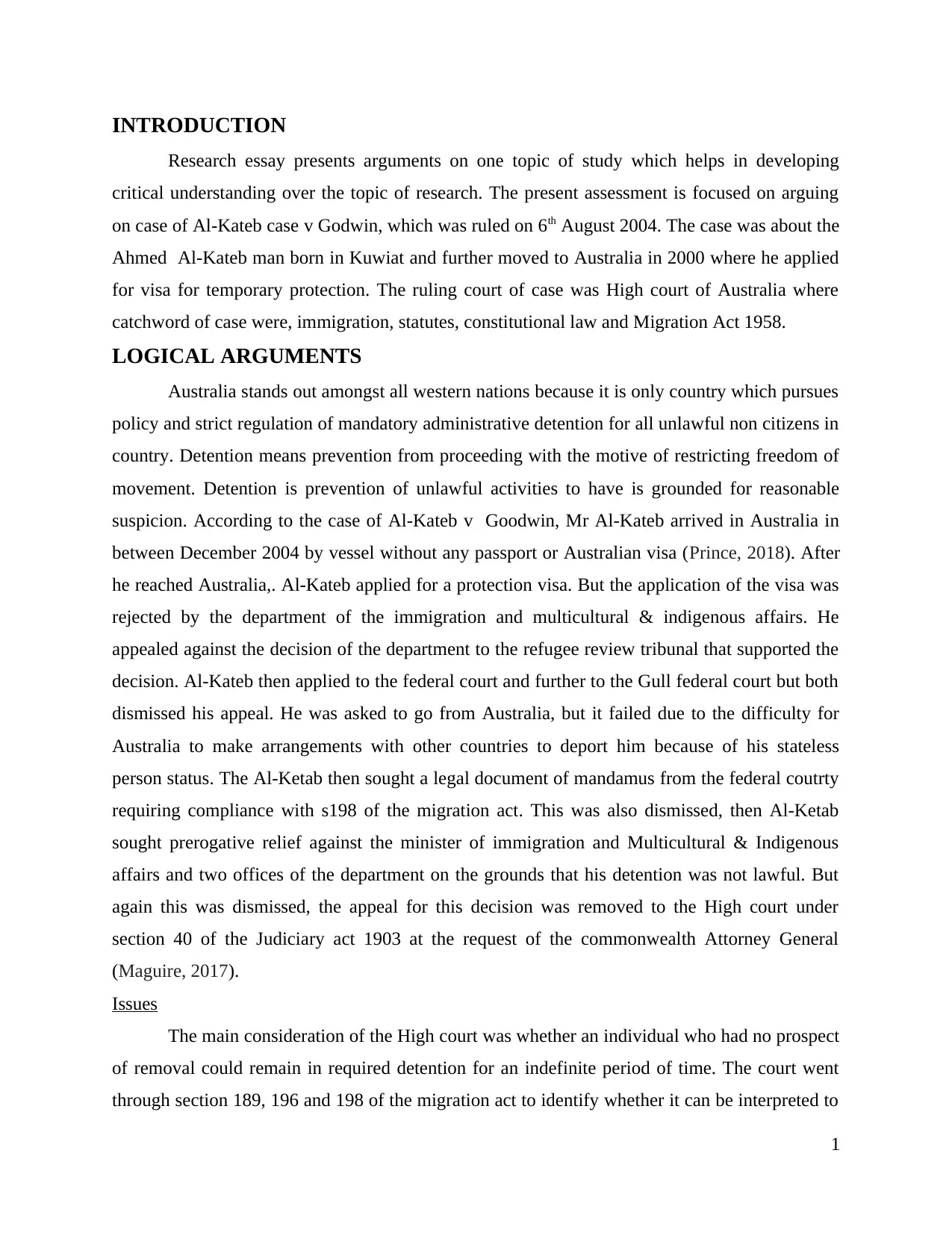
INTRODUCTION
Research essay presents arguments on one topic of study which helps in developing
critical understanding over the topic of research. The present assessment is focused on arguing
on case of Al-Kateb case v Godwin, which was ruled on 6th August 2004. The case was about the
Ahmed Al-Kateb man born in Kuwiat and further moved to Australia in 2000 where he applied
for visa for temporary protection. The ruling court of case was High court of Australia where
catchword of case were, immigration, statutes, constitutional law and Migration Act 1958.
LOGICAL ARGUMENTS
Australia stands out amongst all western nations because it is only country which pursues
policy and strict regulation of mandatory administrative detention for all unlawful non citizens in
country. Detention means prevention from proceeding with the motive of restricting freedom of
movement. Detention is prevention of unlawful activities to have is grounded for reasonable
suspicion. According to the case of Al-Kateb v Goodwin, Mr Al-Kateb arrived in Australia in
between December 2004 by vessel without any passport or Australian visa (Prince, 2018). After
he reached Australia,. Al-Kateb applied for a protection visa. But the application of the visa was
rejected by the department of the immigration and multicultural & indigenous affairs. He
appealed against the decision of the department to the refugee review tribunal that supported the
decision. Al-Kateb then applied to the federal court and further to the Gull federal court but both
dismissed his appeal. He was asked to go from Australia, but it failed due to the difficulty for
Australia to make arrangements with other countries to deport him because of his stateless
person status. The Al-Ketab then sought a legal document of mandamus from the federal coutrty
requiring compliance with s198 of the migration act. This was also dismissed, then Al-Ketab
sought prerogative relief against the minister of immigration and Multicultural & Indigenous
affairs and two offices of the department on the grounds that his detention was not lawful. But
again this was dismissed, the appeal for this decision was removed to the High court under
section 40 of the Judiciary act 1903 at the request of the commonwealth Attorney General
(Maguire, 2017).
Issues
The main consideration of the High court was whether an individual who had no prospect
of removal could remain in required detention for an indefinite period of time. The court went
through section 189, 196 and 198 of the migration act to identify whether it can be interpreted to
1
Research essay presents arguments on one topic of study which helps in developing
critical understanding over the topic of research. The present assessment is focused on arguing
on case of Al-Kateb case v Godwin, which was ruled on 6th August 2004. The case was about the
Ahmed Al-Kateb man born in Kuwiat and further moved to Australia in 2000 where he applied
for visa for temporary protection. The ruling court of case was High court of Australia where
catchword of case were, immigration, statutes, constitutional law and Migration Act 1958.
LOGICAL ARGUMENTS
Australia stands out amongst all western nations because it is only country which pursues
policy and strict regulation of mandatory administrative detention for all unlawful non citizens in
country. Detention means prevention from proceeding with the motive of restricting freedom of
movement. Detention is prevention of unlawful activities to have is grounded for reasonable
suspicion. According to the case of Al-Kateb v Goodwin, Mr Al-Kateb arrived in Australia in
between December 2004 by vessel without any passport or Australian visa (Prince, 2018). After
he reached Australia,. Al-Kateb applied for a protection visa. But the application of the visa was
rejected by the department of the immigration and multicultural & indigenous affairs. He
appealed against the decision of the department to the refugee review tribunal that supported the
decision. Al-Kateb then applied to the federal court and further to the Gull federal court but both
dismissed his appeal. He was asked to go from Australia, but it failed due to the difficulty for
Australia to make arrangements with other countries to deport him because of his stateless
person status. The Al-Ketab then sought a legal document of mandamus from the federal coutrty
requiring compliance with s198 of the migration act. This was also dismissed, then Al-Ketab
sought prerogative relief against the minister of immigration and Multicultural & Indigenous
affairs and two offices of the department on the grounds that his detention was not lawful. But
again this was dismissed, the appeal for this decision was removed to the High court under
section 40 of the Judiciary act 1903 at the request of the commonwealth Attorney General
(Maguire, 2017).
Issues
The main consideration of the High court was whether an individual who had no prospect
of removal could remain in required detention for an indefinite period of time. The court went
through section 189, 196 and 198 of the migration act to identify whether it can be interpreted to
1
⊘ This is a preview!⊘
Do you want full access?
Subscribe today to unlock all pages.

Trusted by 1+ million students worldwide
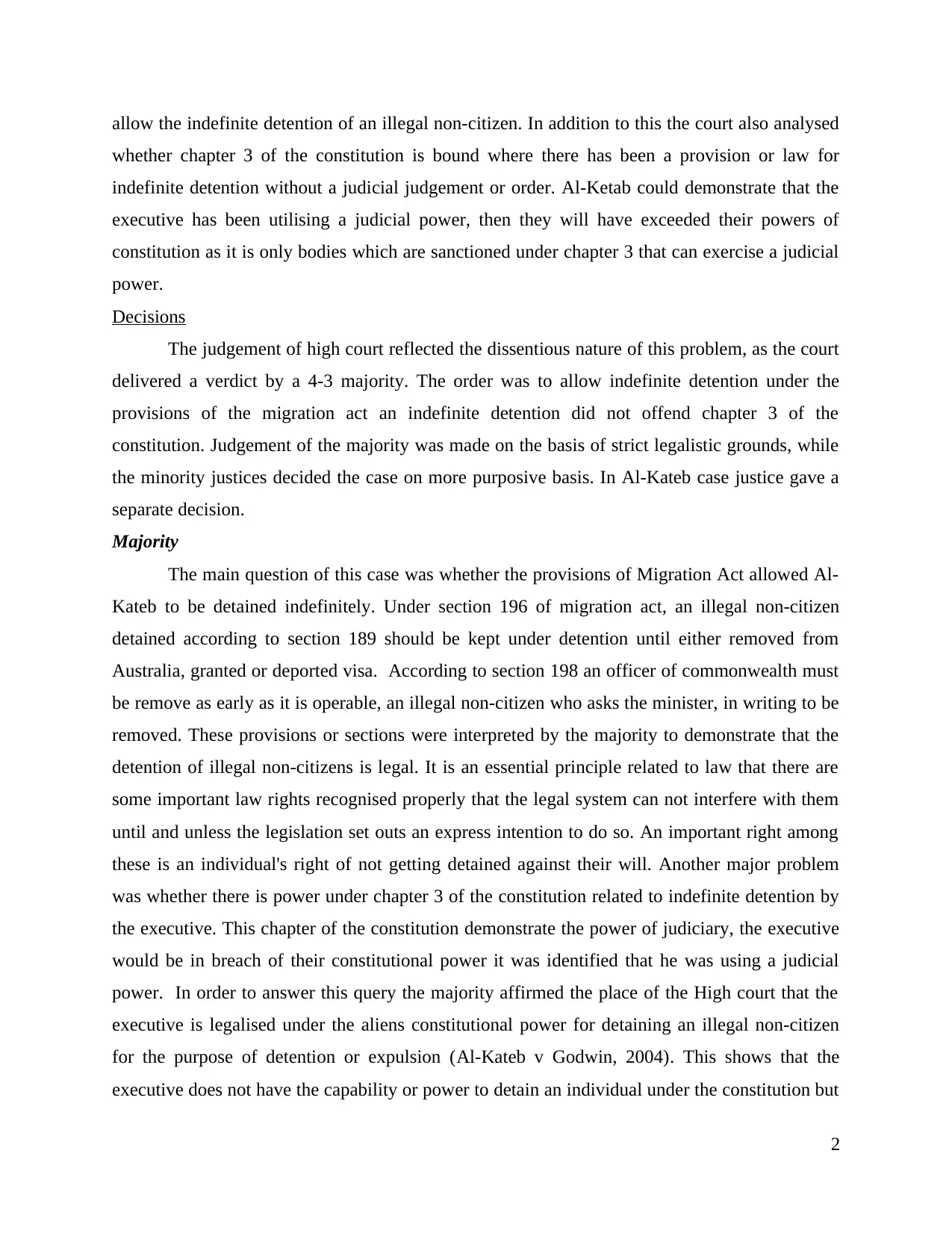
allow the indefinite detention of an illegal non-citizen. In addition to this the court also analysed
whether chapter 3 of the constitution is bound where there has been a provision or law for
indefinite detention without a judicial judgement or order. Al-Ketab could demonstrate that the
executive has been utilising a judicial power, then they will have exceeded their powers of
constitution as it is only bodies which are sanctioned under chapter 3 that can exercise a judicial
power.
Decisions
The judgement of high court reflected the dissentious nature of this problem, as the court
delivered a verdict by a 4-3 majority. The order was to allow indefinite detention under the
provisions of the migration act an indefinite detention did not offend chapter 3 of the
constitution. Judgement of the majority was made on the basis of strict legalistic grounds, while
the minority justices decided the case on more purposive basis. In Al-Kateb case justice gave a
separate decision.
Majority
The main question of this case was whether the provisions of Migration Act allowed Al-
Kateb to be detained indefinitely. Under section 196 of migration act, an illegal non-citizen
detained according to section 189 should be kept under detention until either removed from
Australia, granted or deported visa. According to section 198 an officer of commonwealth must
be remove as early as it is operable, an illegal non-citizen who asks the minister, in writing to be
removed. These provisions or sections were interpreted by the majority to demonstrate that the
detention of illegal non-citizens is legal. It is an essential principle related to law that there are
some important law rights recognised properly that the legal system can not interfere with them
until and unless the legislation set outs an express intention to do so. An important right among
these is an individual's right of not getting detained against their will. Another major problem
was whether there is power under chapter 3 of the constitution related to indefinite detention by
the executive. This chapter of the constitution demonstrate the power of judiciary, the executive
would be in breach of their constitutional power it was identified that he was using a judicial
power. In order to answer this query the majority affirmed the place of the High court that the
executive is legalised under the aliens constitutional power for detaining an illegal non-citizen
for the purpose of detention or expulsion (Al-Kateb v Godwin, 2004). This shows that the
executive does not have the capability or power to detain an individual under the constitution but
2
whether chapter 3 of the constitution is bound where there has been a provision or law for
indefinite detention without a judicial judgement or order. Al-Ketab could demonstrate that the
executive has been utilising a judicial power, then they will have exceeded their powers of
constitution as it is only bodies which are sanctioned under chapter 3 that can exercise a judicial
power.
Decisions
The judgement of high court reflected the dissentious nature of this problem, as the court
delivered a verdict by a 4-3 majority. The order was to allow indefinite detention under the
provisions of the migration act an indefinite detention did not offend chapter 3 of the
constitution. Judgement of the majority was made on the basis of strict legalistic grounds, while
the minority justices decided the case on more purposive basis. In Al-Kateb case justice gave a
separate decision.
Majority
The main question of this case was whether the provisions of Migration Act allowed Al-
Kateb to be detained indefinitely. Under section 196 of migration act, an illegal non-citizen
detained according to section 189 should be kept under detention until either removed from
Australia, granted or deported visa. According to section 198 an officer of commonwealth must
be remove as early as it is operable, an illegal non-citizen who asks the minister, in writing to be
removed. These provisions or sections were interpreted by the majority to demonstrate that the
detention of illegal non-citizens is legal. It is an essential principle related to law that there are
some important law rights recognised properly that the legal system can not interfere with them
until and unless the legislation set outs an express intention to do so. An important right among
these is an individual's right of not getting detained against their will. Another major problem
was whether there is power under chapter 3 of the constitution related to indefinite detention by
the executive. This chapter of the constitution demonstrate the power of judiciary, the executive
would be in breach of their constitutional power it was identified that he was using a judicial
power. In order to answer this query the majority affirmed the place of the High court that the
executive is legalised under the aliens constitutional power for detaining an illegal non-citizen
for the purpose of detention or expulsion (Al-Kateb v Godwin, 2004). This shows that the
executive does not have the capability or power to detain an individual under the constitution but
2
Paraphrase This Document
Need a fresh take? Get an instant paraphrase of this document with our AI Paraphraser
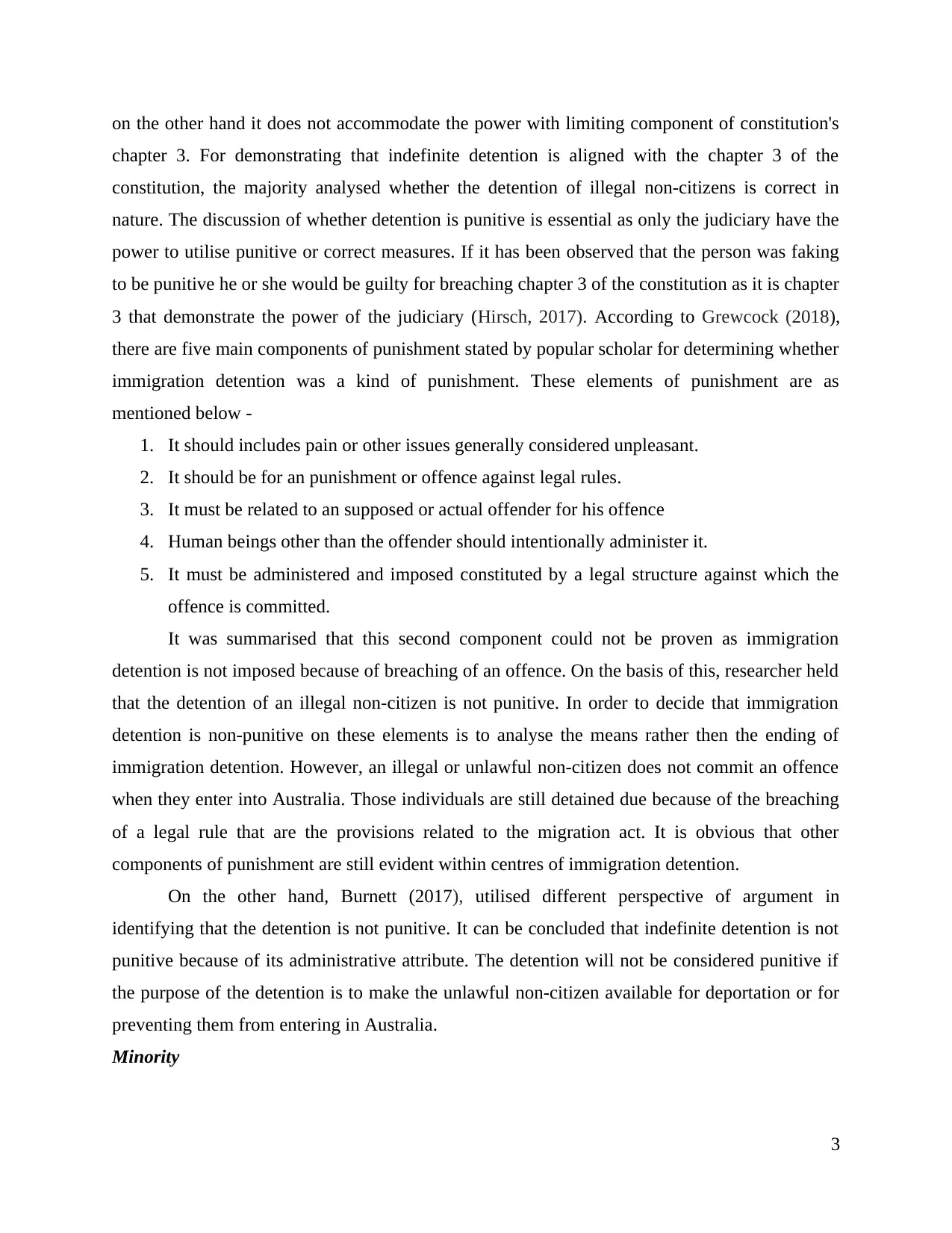
on the other hand it does not accommodate the power with limiting component of constitution's
chapter 3. For demonstrating that indefinite detention is aligned with the chapter 3 of the
constitution, the majority analysed whether the detention of illegal non-citizens is correct in
nature. The discussion of whether detention is punitive is essential as only the judiciary have the
power to utilise punitive or correct measures. If it has been observed that the person was faking
to be punitive he or she would be guilty for breaching chapter 3 of the constitution as it is chapter
3 that demonstrate the power of the judiciary (Hirsch, 2017). According to Grewcock (2018),
there are five main components of punishment stated by popular scholar for determining whether
immigration detention was a kind of punishment. These elements of punishment are as
mentioned below -
1. It should includes pain or other issues generally considered unpleasant.
2. It should be for an punishment or offence against legal rules.
3. It must be related to an supposed or actual offender for his offence
4. Human beings other than the offender should intentionally administer it.
5. It must be administered and imposed constituted by a legal structure against which the
offence is committed.
It was summarised that this second component could not be proven as immigration
detention is not imposed because of breaching of an offence. On the basis of this, researcher held
that the detention of an illegal non-citizen is not punitive. In order to decide that immigration
detention is non-punitive on these elements is to analyse the means rather then the ending of
immigration detention. However, an illegal or unlawful non-citizen does not commit an offence
when they enter into Australia. Those individuals are still detained due because of the breaching
of a legal rule that are the provisions related to the migration act. It is obvious that other
components of punishment are still evident within centres of immigration detention.
On the other hand, Burnett (2017), utilised different perspective of argument in
identifying that the detention is not punitive. It can be concluded that indefinite detention is not
punitive because of its administrative attribute. The detention will not be considered punitive if
the purpose of the detention is to make the unlawful non-citizen available for deportation or for
preventing them from entering in Australia.
Minority
3
chapter 3. For demonstrating that indefinite detention is aligned with the chapter 3 of the
constitution, the majority analysed whether the detention of illegal non-citizens is correct in
nature. The discussion of whether detention is punitive is essential as only the judiciary have the
power to utilise punitive or correct measures. If it has been observed that the person was faking
to be punitive he or she would be guilty for breaching chapter 3 of the constitution as it is chapter
3 that demonstrate the power of the judiciary (Hirsch, 2017). According to Grewcock (2018),
there are five main components of punishment stated by popular scholar for determining whether
immigration detention was a kind of punishment. These elements of punishment are as
mentioned below -
1. It should includes pain or other issues generally considered unpleasant.
2. It should be for an punishment or offence against legal rules.
3. It must be related to an supposed or actual offender for his offence
4. Human beings other than the offender should intentionally administer it.
5. It must be administered and imposed constituted by a legal structure against which the
offence is committed.
It was summarised that this second component could not be proven as immigration
detention is not imposed because of breaching of an offence. On the basis of this, researcher held
that the detention of an illegal non-citizen is not punitive. In order to decide that immigration
detention is non-punitive on these elements is to analyse the means rather then the ending of
immigration detention. However, an illegal or unlawful non-citizen does not commit an offence
when they enter into Australia. Those individuals are still detained due because of the breaching
of a legal rule that are the provisions related to the migration act. It is obvious that other
components of punishment are still evident within centres of immigration detention.
On the other hand, Burnett (2017), utilised different perspective of argument in
identifying that the detention is not punitive. It can be concluded that indefinite detention is not
punitive because of its administrative attribute. The detention will not be considered punitive if
the purpose of the detention is to make the unlawful non-citizen available for deportation or for
preventing them from entering in Australia.
Minority
3
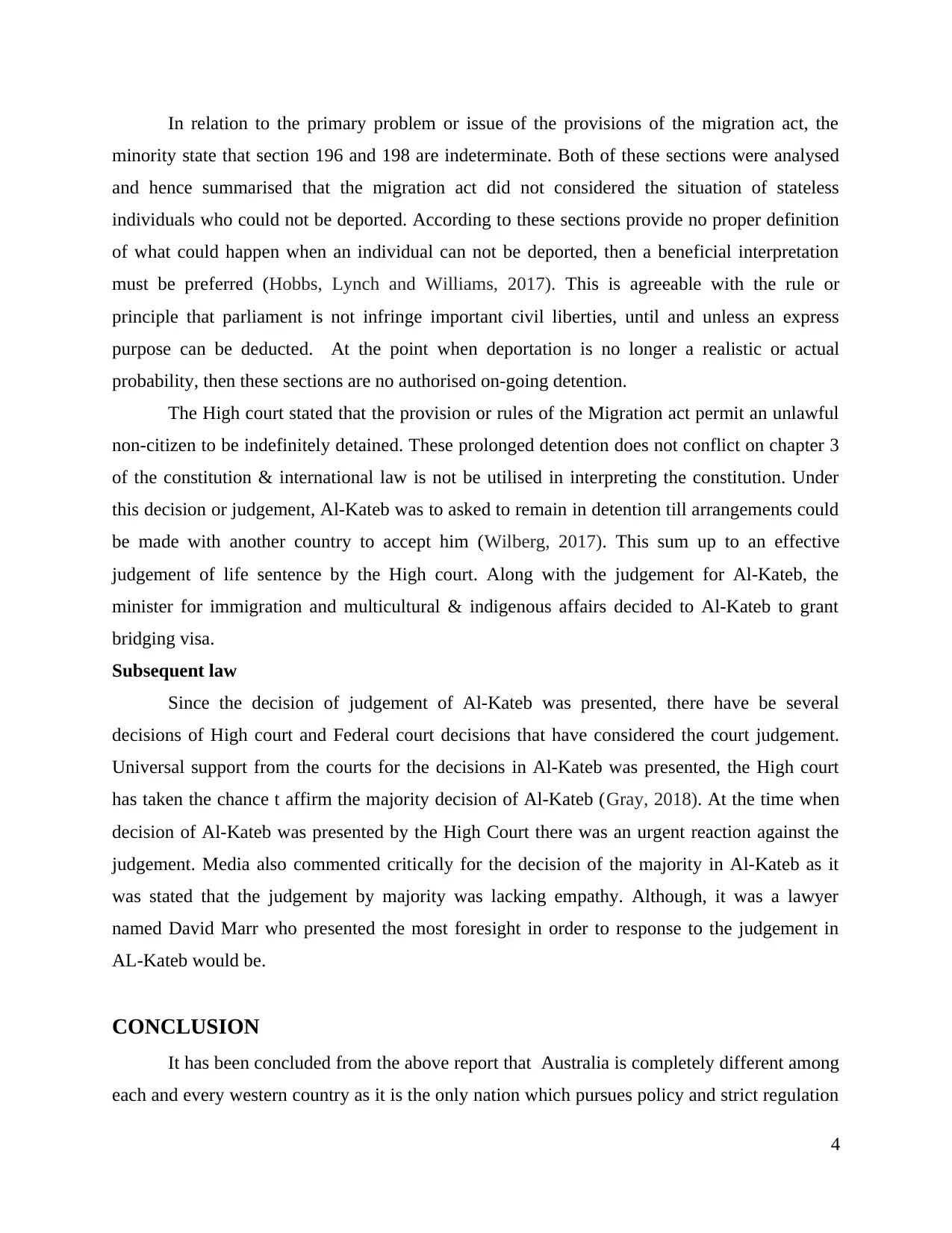
In relation to the primary problem or issue of the provisions of the migration act, the
minority state that section 196 and 198 are indeterminate. Both of these sections were analysed
and hence summarised that the migration act did not considered the situation of stateless
individuals who could not be deported. According to these sections provide no proper definition
of what could happen when an individual can not be deported, then a beneficial interpretation
must be preferred (Hobbs, Lynch and Williams, 2017). This is agreeable with the rule or
principle that parliament is not infringe important civil liberties, until and unless an express
purpose can be deducted. At the point when deportation is no longer a realistic or actual
probability, then these sections are no authorised on-going detention.
The High court stated that the provision or rules of the Migration act permit an unlawful
non-citizen to be indefinitely detained. These prolonged detention does not conflict on chapter 3
of the constitution & international law is not be utilised in interpreting the constitution. Under
this decision or judgement, Al-Kateb was to asked to remain in detention till arrangements could
be made with another country to accept him (Wilberg, 2017). This sum up to an effective
judgement of life sentence by the High court. Along with the judgement for Al-Kateb, the
minister for immigration and multicultural & indigenous affairs decided to Al-Kateb to grant
bridging visa.
Subsequent law
Since the decision of judgement of Al-Kateb was presented, there have be several
decisions of High court and Federal court decisions that have considered the court judgement.
Universal support from the courts for the decisions in Al-Kateb was presented, the High court
has taken the chance t affirm the majority decision of Al-Kateb (Gray, 2018). At the time when
decision of Al-Kateb was presented by the High Court there was an urgent reaction against the
judgement. Media also commented critically for the decision of the majority in Al-Kateb as it
was stated that the judgement by majority was lacking empathy. Although, it was a lawyer
named David Marr who presented the most foresight in order to response to the judgement in
AL-Kateb would be.
CONCLUSION
It has been concluded from the above report that Australia is completely different among
each and every western country as it is the only nation which pursues policy and strict regulation
4
minority state that section 196 and 198 are indeterminate. Both of these sections were analysed
and hence summarised that the migration act did not considered the situation of stateless
individuals who could not be deported. According to these sections provide no proper definition
of what could happen when an individual can not be deported, then a beneficial interpretation
must be preferred (Hobbs, Lynch and Williams, 2017). This is agreeable with the rule or
principle that parliament is not infringe important civil liberties, until and unless an express
purpose can be deducted. At the point when deportation is no longer a realistic or actual
probability, then these sections are no authorised on-going detention.
The High court stated that the provision or rules of the Migration act permit an unlawful
non-citizen to be indefinitely detained. These prolonged detention does not conflict on chapter 3
of the constitution & international law is not be utilised in interpreting the constitution. Under
this decision or judgement, Al-Kateb was to asked to remain in detention till arrangements could
be made with another country to accept him (Wilberg, 2017). This sum up to an effective
judgement of life sentence by the High court. Along with the judgement for Al-Kateb, the
minister for immigration and multicultural & indigenous affairs decided to Al-Kateb to grant
bridging visa.
Subsequent law
Since the decision of judgement of Al-Kateb was presented, there have be several
decisions of High court and Federal court decisions that have considered the court judgement.
Universal support from the courts for the decisions in Al-Kateb was presented, the High court
has taken the chance t affirm the majority decision of Al-Kateb (Gray, 2018). At the time when
decision of Al-Kateb was presented by the High Court there was an urgent reaction against the
judgement. Media also commented critically for the decision of the majority in Al-Kateb as it
was stated that the judgement by majority was lacking empathy. Although, it was a lawyer
named David Marr who presented the most foresight in order to response to the judgement in
AL-Kateb would be.
CONCLUSION
It has been concluded from the above report that Australia is completely different among
each and every western country as it is the only nation which pursues policy and strict regulation
4
⊘ This is a preview!⊘
Do you want full access?
Subscribe today to unlock all pages.

Trusted by 1+ million students worldwide
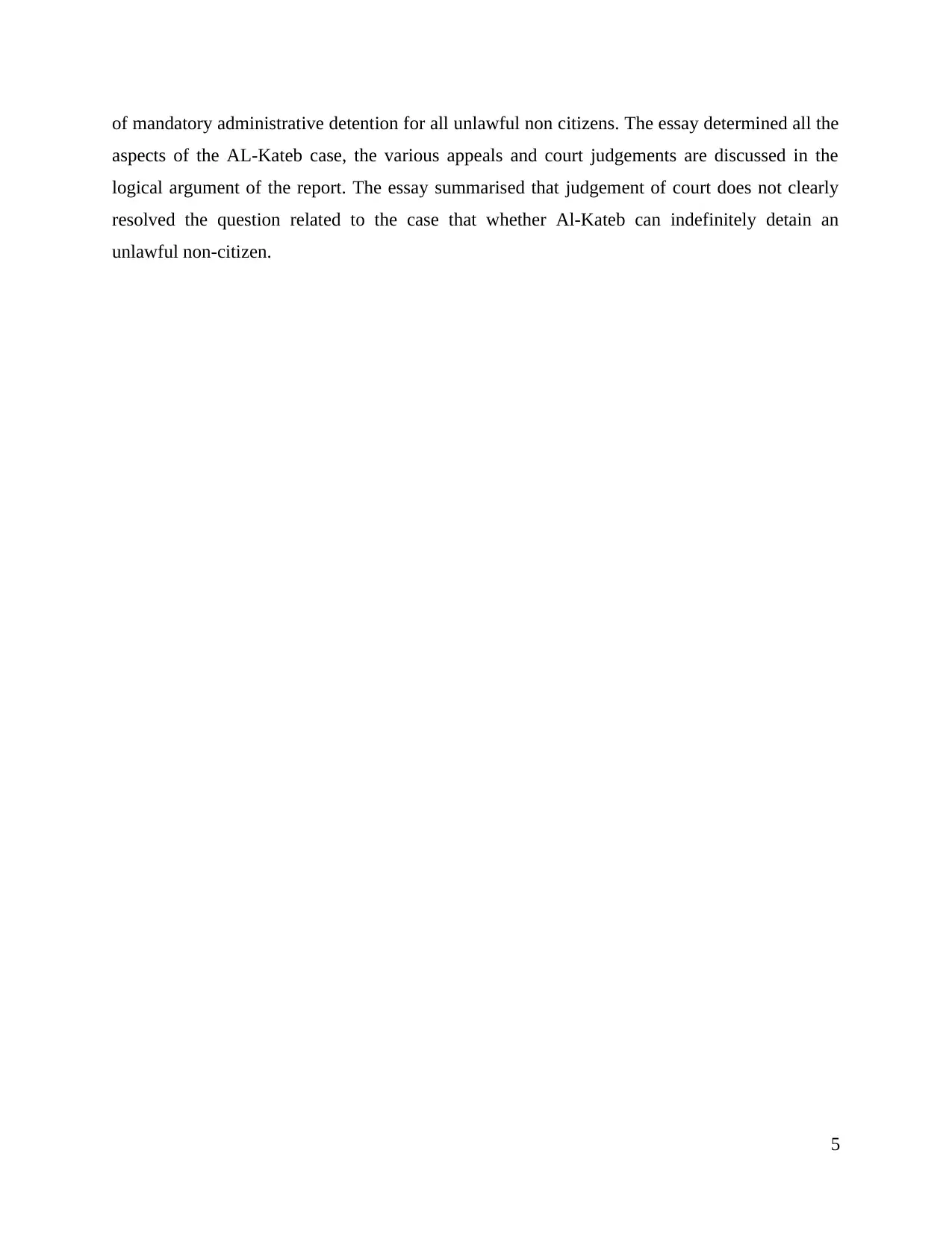
of mandatory administrative detention for all unlawful non citizens. The essay determined all the
aspects of the AL-Kateb case, the various appeals and court judgements are discussed in the
logical argument of the report. The essay summarised that judgement of court does not clearly
resolved the question related to the case that whether Al-Kateb can indefinitely detain an
unlawful non-citizen.
5
aspects of the AL-Kateb case, the various appeals and court judgements are discussed in the
logical argument of the report. The essay summarised that judgement of court does not clearly
resolved the question related to the case that whether Al-Kateb can indefinitely detain an
unlawful non-citizen.
5
Paraphrase This Document
Need a fresh take? Get an instant paraphrase of this document with our AI Paraphraser
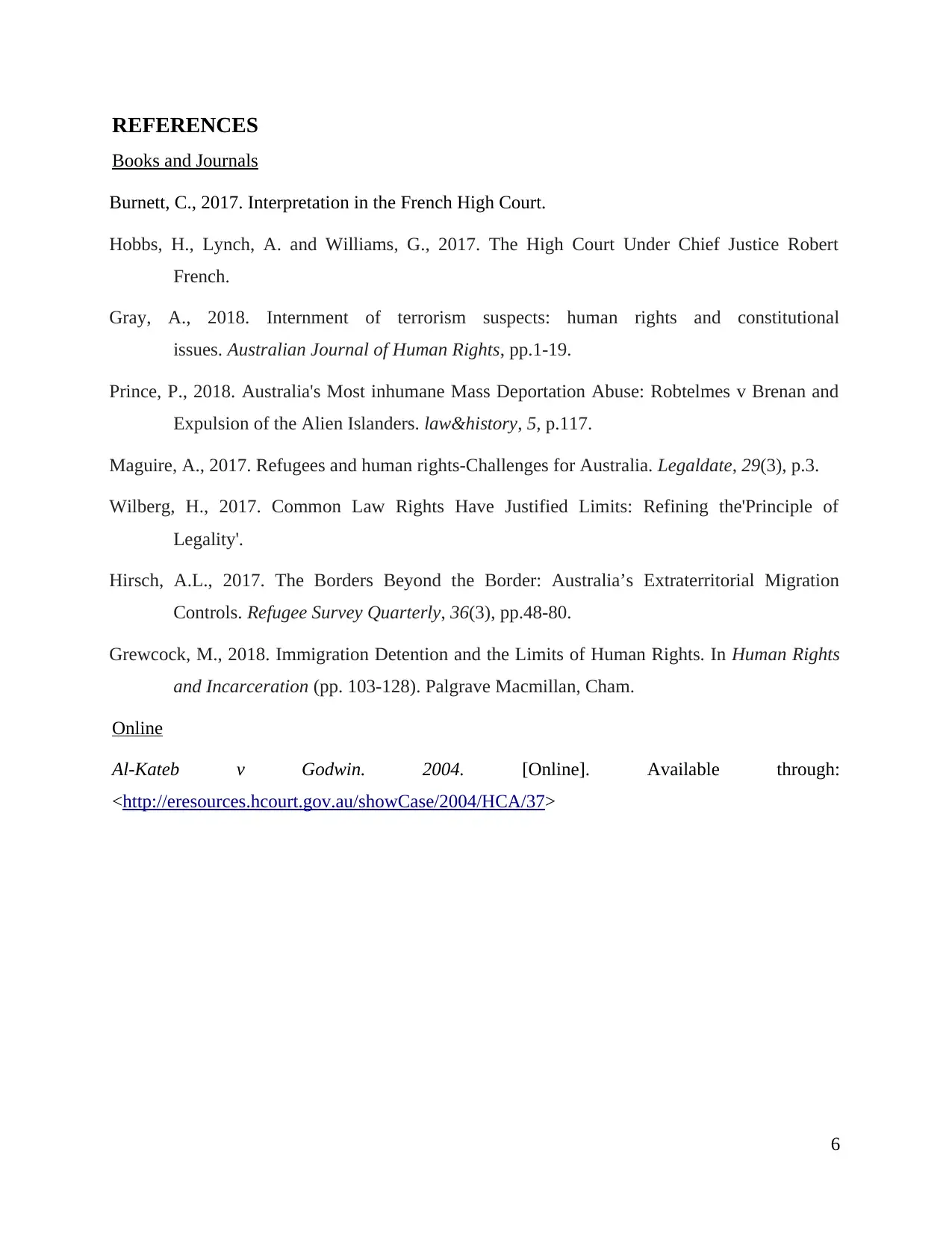
REFERENCES
Books and Journals
Burnett, C., 2017. Interpretation in the French High Court.
Hobbs, H., Lynch, A. and Williams, G., 2017. The High Court Under Chief Justice Robert
French.
Gray, A., 2018. Internment of terrorism suspects: human rights and constitutional
issues. Australian Journal of Human Rights, pp.1-19.
Prince, P., 2018. Australia's Most inhumane Mass Deportation Abuse: Robtelmes v Brenan and
Expulsion of the Alien Islanders. law&history, 5, p.117.
Maguire, A., 2017. Refugees and human rights-Challenges for Australia. Legaldate, 29(3), p.3.
Wilberg, H., 2017. Common Law Rights Have Justified Limits: Refining the'Principle of
Legality'.
Hirsch, A.L., 2017. The Borders Beyond the Border: Australia’s Extraterritorial Migration
Controls. Refugee Survey Quarterly, 36(3), pp.48-80.
Grewcock, M., 2018. Immigration Detention and the Limits of Human Rights. In Human Rights
and Incarceration (pp. 103-128). Palgrave Macmillan, Cham.
Online
Al-Kateb v Godwin. 2004. [Online]. Available through:
<http://eresources.hcourt.gov.au/showCase/2004/HCA/37>
6
Books and Journals
Burnett, C., 2017. Interpretation in the French High Court.
Hobbs, H., Lynch, A. and Williams, G., 2017. The High Court Under Chief Justice Robert
French.
Gray, A., 2018. Internment of terrorism suspects: human rights and constitutional
issues. Australian Journal of Human Rights, pp.1-19.
Prince, P., 2018. Australia's Most inhumane Mass Deportation Abuse: Robtelmes v Brenan and
Expulsion of the Alien Islanders. law&history, 5, p.117.
Maguire, A., 2017. Refugees and human rights-Challenges for Australia. Legaldate, 29(3), p.3.
Wilberg, H., 2017. Common Law Rights Have Justified Limits: Refining the'Principle of
Legality'.
Hirsch, A.L., 2017. The Borders Beyond the Border: Australia’s Extraterritorial Migration
Controls. Refugee Survey Quarterly, 36(3), pp.48-80.
Grewcock, M., 2018. Immigration Detention and the Limits of Human Rights. In Human Rights
and Incarceration (pp. 103-128). Palgrave Macmillan, Cham.
Online
Al-Kateb v Godwin. 2004. [Online]. Available through:
<http://eresources.hcourt.gov.au/showCase/2004/HCA/37>
6
1 out of 8
Related Documents
Your All-in-One AI-Powered Toolkit for Academic Success.
+13062052269
info@desklib.com
Available 24*7 on WhatsApp / Email
![[object Object]](/_next/static/media/star-bottom.7253800d.svg)
Unlock your academic potential
Copyright © 2020–2025 A2Z Services. All Rights Reserved. Developed and managed by ZUCOL.





